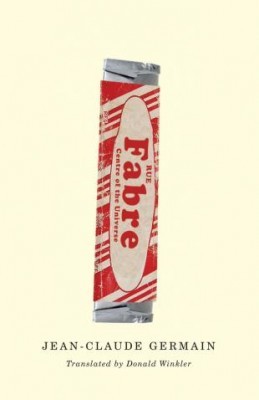There should be more books like this: amiable, interesting, fun to read; a blend of memoir and history and social study; much of it told through the curious but not always comprehending eyes of a boy, much of it sweet and very charming.
The title calls rue Fabre the centre of the universe (Fabre, a residential street in Montreal, runs between Parc Lafontaine and the Metropolitan, two streets west of Papineau). And maybe it is the centre, but not much in the book happens there. The stories are more of excursions to the edges of the universe: the West Island, the Laurentians, the South Shore.

Rue Fabre
Centre of the Universe
Jean-Claude Germain
Translated by Donald Winkler
Véhicule Press
$18.00
paper
135pp
978-1-55065-328-1
Brief encounters with people and fleeting experiences in unfamiliar places leave impressions that lasted a lifetime. In Sainte-Geneviève, for instance:
There are snow banks as high as the truck’s roof, you can see everybody’s breath, everyone has red cheeks and raises his voice, dogs bark, horses snort, stablemen curse, and when I go into what seems to me to be a general store, a lady in charge takes me under her wing, removes my coat and mitts, unwinds my scarf, sits me in front of a purring white- hot stove, serves me a bowl of bread and milk laced with maple sugar …
The young Jean-Claude follows his father around, but he is his father’s adjunct rather than his own being (which brings to mind Peter O’Toole’s admission that he was “nothing but Patrick O’Toole’s son” till he was 30 years old). The boy catches glimpses
of things, hints of his father’s past, but it’s a child’s eye view, incomplete, puzzling. He hears in disbelief that his father once played drums in a band. He watches in astonishment as his father dances a tango with the wife of an old acquaintance encountered on a Montreal street corner. But enlightenment is hard to come by. “Oh, that was in another life,” is his dad’s standard explanation of people he knew, things he once did.
The family relocates sometime in the 1950s to the South Shore of Montreal, a patchwork of communities, some established, some new, Mackayville, a Gypsy camp of tarpapered houses, Greenfield Park, a touch of Olde England where “children were born almost as old as their parents.” The family operates a small store there, where a pay phone and one- sided conversations offer enticements and mysteries.
There’s more, too; visits to the Orange Julep and Mendelsohn’s pawnshop; the romance of the horse in Québec; the building of roads; the exploits, glorious and otherwise, of early explorers. And la grande noirceur, the mechanics of paying off traffic cops, the advantages of a brothel next door: “Every time the Madam sent one of them on an errand, most often she would knock on the back door to ask Mama if she needed something at the store. They were the best neighbours we ever had.”
Armed, no doubt, by having carefully stored away all that he had seen and heard, Jean-Claude Germain grew up and became a distinguished journalist, historian, and author. He wrote many plays and encouraged many other playwrights in his years as artistic director of Montreal’s Théâtre d’Aujourd’hui. He taught at the National Theatre School of Canada. He also told stories – some historical, including the year-by-year saga of the history of Montreal from 1642 to 1992 on cbf Montréal, and others personal, like this delightful memoir. mRb






0 Comments